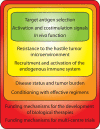Chimeric antigen receptors for T cell immunotherapy: current understanding and future directions - PubMed (original) (raw)
Review
Chimeric antigen receptors for T cell immunotherapy: current understanding and future directions
Kevin J Curran et al. J Gene Med. 2012 Jun.
Abstract
Background: The genetic engineering of T cells through the introduction of a chimeric antigen receptor (CAR) allows for generation of tumor-targeted T cells. Once expressed by T cells, CARs combine antigen-specificity with T cell activation in a single fusion molecule. Most CARs are comprised of an antigen-binding domain, an extracellular spacer/hinge region, a trans-membrane domain and an intracellular signaling domain resulting in T cell activation after antigen binding.
Methods: We performed a search of the literature regarding tumor immunotherapy using CAR-modified T cells to provide a concise review of this topic.
Results: This review aims to focus on the elements of CAR design required for successful application of this technology in cancer immunotherapy. Most notably, proper target antigen selection, co-stimulatory signaling, and the ability of CAR-modified T cells to traffic, persist and retain function after adoptive transfer are required for optimal tumor eradication. Furthermore, recent clinical trials have demonstrated tumor burden and chemotherapy conditioning before adoptive transfer as being critically important for this therapy. Future research into counteracting the suppressive tumor microenvironment and the ability to activate an endogenous anti-tumor response by CAR-modified T cells may enhance the therapeutic potential of this treatment.
Conclusions: In conclusion, CAR-modified T cell therapy is a highly promising treatment for cancer, having already demonstrated both promising preclinical and clinical results. However, further modification and additional clinical trials will need to be conducted to ultimately optimize the anti-tumor efficacy of this approach.
Copyright © 2012 John Wiley & Sons, Ltd.
Figures
Figure 1. Considerations for effective CAR modified T cell Immunotherapy
Successful application of CAR modified T cell immunotherapy requires the consideration of several qualities, including the CAR design, tumor microenvironment, patient clinical status, and funding mechanisms required for CAR development and clinical trials.
Comment in
- When transgenes shape immunity: cancer immune-gene therapy.
Bonini C, Parmiani G. Bonini C, et al. J Gene Med. 2012 Jun;14(6):384-5. doi: 10.1002/jgm.2645. J Gene Med. 2012. PMID: 22736622 No abstract available.
Similar articles
- CAR-modified T-cell therapy for cancer: an updated review.
Haji-Fatahaliha M, Hosseini M, Akbarian A, Sadreddini S, Jadidi-Niaragh F, Yousefi M. Haji-Fatahaliha M, et al. Artif Cells Nanomed Biotechnol. 2016 Sep;44(6):1339-49. doi: 10.3109/21691401.2015.1052465. Epub 2015 Jun 11. Artif Cells Nanomed Biotechnol. 2016. PMID: 26068778 Review. - Targeted immunotherapy of cancer with CAR T cells: achievements and challenges.
Lipowska-Bhalla G, Gilham DE, Hawkins RE, Rothwell DG. Lipowska-Bhalla G, et al. Cancer Immunol Immunother. 2012 Jul;61(7):953-62. doi: 10.1007/s00262-012-1254-0. Epub 2012 Apr 22. Cancer Immunol Immunother. 2012. PMID: 22527245 Free PMC article. Review. - CAR T-cell Therapy: A New Era in Cancer Immunotherapy.
Miliotou AN, Papadopoulou LC. Miliotou AN, et al. Curr Pharm Biotechnol. 2018;19(1):5-18. doi: 10.2174/1389201019666180418095526. Curr Pharm Biotechnol. 2018. PMID: 29667553 Review. - Chimeric antigen receptor (CAR)-engineered lymphocytes for cancer therapy.
Ramos CA, Dotti G. Ramos CA, et al. Expert Opin Biol Ther. 2011 Jul;11(7):855-73. doi: 10.1517/14712598.2011.573476. Epub 2011 Apr 4. Expert Opin Biol Ther. 2011. PMID: 21463133 Free PMC article. Review. - Strategies to improve the clinical performance of chimeric antigen receptor-modified T cells for cancer.
Zhang Q, Li H, Yang J, Li L, Zhang B, Li J, Zheng J. Zhang Q, et al. Curr Gene Ther. 2013 Feb;13(1):65-70. doi: 10.2174/156652313804806570. Curr Gene Ther. 2013. PMID: 23256743 Review.
Cited by
- Navigating the therapeutic landscape for breast cancer: targeting breast cancer stem cells.
Dey S, Dinakar YH, R S, Jain V, Jain R. Dey S, et al. Naunyn Schmiedebergs Arch Pharmacol. 2024 Oct 23. doi: 10.1007/s00210-024-03542-5. Online ahead of print. Naunyn Schmiedebergs Arch Pharmacol. 2024. PMID: 39441235 Review. - CAR-T-Cell Therapy for Systemic Lupus Erythematosus: A Comprehensive Overview.
Abdalhadi HM, Chatham WW, Alduraibi FK. Abdalhadi HM, et al. Int J Mol Sci. 2024 Sep 29;25(19):10511. doi: 10.3390/ijms251910511. Int J Mol Sci. 2024. PMID: 39408836 Free PMC article. Review. - Renal cancer: signaling pathways and advances in targeted therapies.
Jiang A, Li J, He Z, Liu Y, Qiao K, Fang Y, Qu L, Luo P, Lin A, Wang L. Jiang A, et al. MedComm (2020). 2024 Aug 1;5(8):e676. doi: 10.1002/mco2.676. eCollection 2024 Aug. MedComm (2020). 2024. PMID: 39092291 Free PMC article. Review. - Dual blockade immunotherapy targeting PD-1/PD-L1 and CTLA-4 in lung cancer.
Cheng W, Kang K, Zhao A, Wu Y. Cheng W, et al. J Hematol Oncol. 2024 Jul 27;17(1):54. doi: 10.1186/s13045-024-01581-2. J Hematol Oncol. 2024. PMID: 39068460 Free PMC article. Review. - rhIL-7-hyFc, a long-acting interleukin-7, improves efficacy of CAR-T cell therapy in solid tumors.
Li D, Liang T, Hutchins LE, Wolfarth AA, Ferrando-Martinez S, Lee BH, Ho M. Li D, et al. J Immunother Cancer. 2024 Jul 23;12(7):e008989. doi: 10.1136/jitc-2024-008989. J Immunother Cancer. 2024. PMID: 39043602 Free PMC article.
References
Publication types
MeSH terms
Substances
Grants and funding
- P01 CA190174/CA/NCI NIH HHS/United States
- P01 CA059350/CA/NCI NIH HHS/United States
- CA-138738/CA/NCI NIH HHS/United States
- R01 CA138738/CA/NCI NIH HHS/United States
- K12 CA184746/CA/NCI NIH HHS/United States
- CA-59350/CA/NCI NIH HHS/United States
LinkOut - more resources
Full Text Sources
Other Literature Sources
